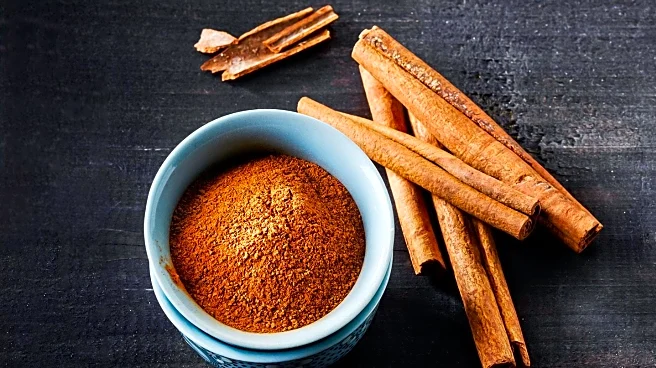What's Happening?
Cinnamon, a widely used spice, is gaining attention for its potential health benefits. According to dietitians, cinnamon is rich in antioxidants and anti-inflammatory properties, which may help protect cells, lower inflammation, and reduce the risk of chronic diseases. Consuming around a teaspoon of cinnamon daily could aid in controlling blood sugar, boosting insulin sensitivity, and supporting heart health. However, experts caution against large doses or cinnamon supplements due to potential interactions with medications and negative health effects. The type of cinnamon consumed also matters, as Cassia cinnamon contains higher levels of coumarin, which can be harmful to the liver in large amounts, whereas Ceylon cinnamon is considered safer.
Why It's Important?
The potential health benefits of cinnamon could have significant implications for individuals managing conditions like diabetes and heart disease. By improving blood sugar regulation and supporting heart health, cinnamon could serve as a complementary dietary addition for those at risk of metabolic diseases. However, the risks associated with excessive consumption, particularly of Cassia cinnamon, highlight the importance of moderation and informed choices. This underscores the need for public awareness about the types of cinnamon and their respective health impacts, especially for those who consume it regularly or in supplement form.
What's Next?
Further research is needed to fully understand the long-term effects of cinnamon consumption on health. Meanwhile, individuals are advised to incorporate cinnamon into their diets in moderation and consult healthcare providers if they have concerns about potential interactions with medications. The ongoing study of cinnamon's health benefits may lead to more precise dietary recommendations and guidelines, particularly for those with specific health conditions.
Beyond the Headlines
The discussion around cinnamon also touches on broader themes of dietary supplements and natural remedies in health management. As interest in alternative and complementary medicine grows, understanding the balance between traditional uses and scientific evidence becomes crucial. This case highlights the importance of integrating traditional knowledge with modern research to optimize health outcomes.








